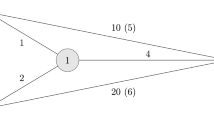Abstract
We consider cost-sharing mechanisms for the Steiner tree game. In this well-studied cooperative game, each selfish user expresses his/her willingness to pay for being connected to a source node s in an underlying graph. A mechanism decides which users will be connected and divides the cost of the corresponding (optimal) Steiner tree among these users (budget balance condition). Since users can form coalitions and misreport their willingness to pay, the mechanism must be group strategyproof: even coalitions of users cannot benefit from lying to the mechanism.
We present new polynomial-time mechanisms which satisfy a standard set of axioms considered in the literature (i.e., budget balance, group strategyproofness, voluntary participation, consumer sovereignty, no positive transfer, cost optimality) and consider the free riders issue recently raised by Immorlica et al. [SODA 2005]: it would be desirable to avoid users that are connected for free. We also provide a number of negative results on the existence of polynomial-time mechanisms with certain guarantee on the number of free riders. Finally, we extend our technique and results to a variant considered by Biló et al. [SPAA 2004] with applications to wireless multicast cost sharing.
Work supported by the European Project IST-2001-33135, Critical Resource Sharing for Cooperation in Complex Systems (CRESCCO).
Preview
Unable to display preview. Download preview PDF.
Similar content being viewed by others
References
Althaus, E., Calinescu, G., Mandoiu, I., Prasad, S., Tchervenski, N., Zelikovsky, A.: Power efficient range assignment in ad-hoc wireless networks. Preliminary results in WCNC 2003 and TCS 2003 (2003); Submitted journal version available at http://www.cs.iit.edu/calinesc/
Biló, V., Di Francescomarino, C., Flammini, M., Melideo, G.: Sharing the cost of multicast transmissions in wireless networks. In: Proceedings of SPAA, pp. 180–187 (2004)
Feigenbaum, J., Papadimitriou, C.H., Shenker, S.: Sharing the cost of multicast transmissions. Journal of Computer and System Sciences 63(1), 21–41 (2001)
Flammini, M., Navarra, A., Klasing, R., Perennes, S.: Improved approximation results for the minimum energy broadcasting problem. In: Proc. of the joint workshop on Foundations of mobile computing (DIALM-POMC), pp. 85–91. ACM Press, New York (2004)
Garey, M.R., Johnson, D.S.: Computers and intractability: a guide to the theory of NP-completeness. Freeman, New York (1979)
Immorlica, N., Mahdian, M., Mirrokni, V.: Limitations of cross-monotonic cost-sharing schemes. In: Proc. of the 16th Annual ACM Symposium on Discrete Algorithms (SODA) (January 2005)
Jain, K., Vazirani, V.V.: Applications of approximation algorithms to cooperative games. In: Annual ACM Symposium on Theory of Computing (STOC), pp. 364–372 (2001)
Kent, K., Skorin-Kapov, D.: Population monotonic cost allocation on MST’s. In: Operational Research Proceedings KOI, vol. 43–48 (1996)
Könemann, J., Leonardi, S., Schäfer, G.: A group-strategyproof mechanism for Steiner forests. In: Proc. of the 16th Annual ACM Symposium on Discrete Algorithms (SODA). ACM Press, New York (2005) (to appear)
Leonardi, S., Schäfer, G.: Cross-monotonic cost-sharing methods for connected facility location games. Technical Report MPI-I-2003-1-017, Max-Plankt-Institut für Informatik, September 2003. In: Proc. of 5th ACM Conference on Electronic Commerce (EC), pp. 242–243. ACM Press, New York (2004)
Megiddo, N.: Cost allocation for Steiner trees. Networks 8, 1–6 (1978)
Moulin, H.: Incremental cost sharing: characterization by coalition strategy-proofness. Social Choice and Welfare 16, 279–320 (1999)
Moulin, H., Shenker, S.: Strategyproof sharing of submodular costs: budget balance versus efficiency (1997), http://www.aciri.org/shenker/cost.ps
Pàl, M., Tardos, É.: Strategy proof mechanisms via primal-dual algorithms. In: Proc. of the 44th FOCS (2003)
Penna, P., Ventre, C.: More Powerful and Simpler Cost-Sharing Methods. In: Persiano, G., Solis-Oba, R. (eds.) WAOA 2004. LNCS, vol. 3351, pp. 97–110. Springer, Heidelberg (2005)
Robins, A., Zelikovsky: Improved approximation Steiner tree in graphs. In: Proc. of the 11th Annual ACM Symposium on Discrete Algorithms (SODA), pp. 770–779 (2000)
van Zwam, S.: A lower bound on the cost recovery of the Steiner tree game with cross-monotonic cost shares. Technical Report 18-04, Dipartimento di Informatica e Sistemistica, Università di Roma “La Sapienza” (2004)
Young, H.P.: Cost Allocation. In: Aumann, R.J., Hart, S. (eds.). Handbook of Game Theory, vol. 2, ch. 34, pp. 1193–1235. Elsevier Science, Amsterdam (1994)
Author information
Authors and Affiliations
Editor information
Editors and Affiliations
Rights and permissions
Copyright information
© 2005 Springer-Verlag Berlin Heidelberg
About this paper
Cite this paper
Penna, P., Ventre, C. (2005). Free-Riders in Steiner Tree Cost-Sharing Games. In: Pelc, A., Raynal, M. (eds) Structural Information and Communication Complexity. SIROCCO 2005. Lecture Notes in Computer Science, vol 3499. Springer, Berlin, Heidelberg. https://doi.org/10.1007/11429647_19
Download citation
DOI: https://doi.org/10.1007/11429647_19
Publisher Name: Springer, Berlin, Heidelberg
Print ISBN: 978-3-540-26052-3
Online ISBN: 978-3-540-32073-9
eBook Packages: Computer ScienceComputer Science (R0)




